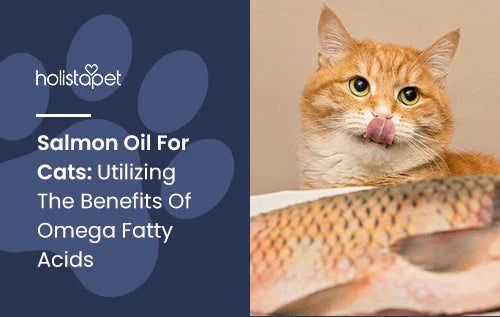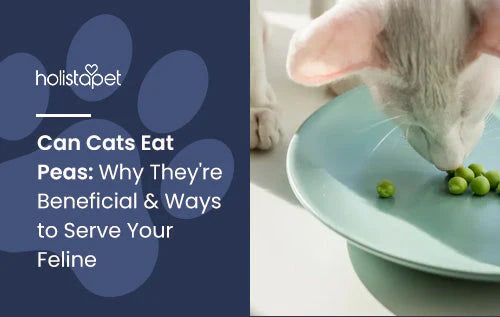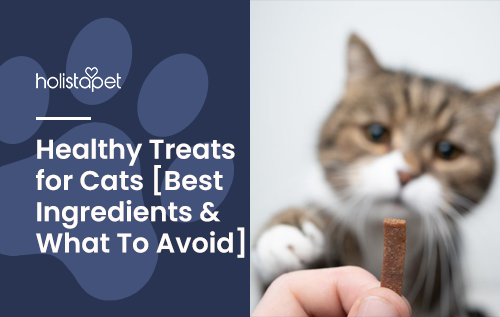Humans have long known about the many benefits of fish oil, making it one of the most popular nutritional supplements in the world, but we aren't the only ones who can gain from it. Salmon or fish oil for dogs and cats is a trendy product that promises to boost your pet's health, but does it live up to its word? Let's find out!
What is Salmon Oil for Cats?
Fish oil comes from the tissue of various underwater species. Popular fish oils include krill, cod, and sardines. However, salmon reigns supreme as the most common and popular source for fish oil supplements. Whether you get farmed salmon or Wild Alaskan salmon oil, it comes packed with essential omega 3 and omega 6 fatty acids.
Is salmon oil good for cats? Well, doctors call them "essential" because mammals need them but can't produce them on their own. Fortunately, dietary supplements can fill in the gaps where our own bodies come up short. There are two types of omega 3 fatty acid in salmon oil:
- Eicosapentaenoic Acid (EPA)
- Docosahexaenoic Acid (DHA)
You can buy EPA and DHA supplements separately, but we don't recommend them. You and your cat need both forms of omega 3 to live your best lives. EPA and DHA offer different but complementary benefits.

Advantages of Salmon Oil for Cats
So, what do these omega-3 and omega-6 fatty acids actually do for cats? The short answer is — a lot. EPA and DHA benefit multiple organ systems. Let's go through them one at a time.
Joints
Joint issues are extremely common in aging pets (and aging people, too!), so don't be surprised if your feline friend encounters them when they reach senior status. Fortunately, the omega fatty acids in a salmon oil supplement may provide relief. When an animal ingests something, their body breaks it down into smaller compounds called metabolites.
There are many metabolites of EPA and DHA, including specialized pro-resolving mediators (SPM). Clinical research suggests that SPM have anti-inflammatory properties. An omega-rich supplement like salmon oil can improve your cat's SPM levels, helping to regulate a proper immune response.
Heart
Many vets recommend giving fish oil to your cat to support their cardiovascular system. Now, you might think anything with the word "fat" in it is destined to cause heart disease. However, there are multiple forms of fat. Omegas offer benefits while other forms like trans fat and saturated fat increase the risk of blood clots, high blood pressure, and other cardiovascular ailments.
Triglycerides are a particularly nasty form of fat that can harden arteries and increase the risk of cardiac arrest. Amazingly, both EPA and DHA reduce triglyceride levels in the bloodstream, supporting cardiovascular health.
Kidneys
Inflammation, high blood pressure, and high levels of unhealthy fats are risk factors for kidney disease. As we just went over, the DHA and EPA in salmon oil reduce inflammation and triglyceride levels, improving conditions for the kidneys.
Brain
Omega fatty acids, particularly DHA, play a critical role in cognitive function. A study in human beings revealed that low levels of DHA in the blood contributed to accelerated brain aging and smaller brain size. Cognitive decline is a natural part of the aging process, but this exciting research suggests you can minimize its impact on your cat.
Even more amazing, further research indicates that when pregnant women take fish oil supplements, their children grow up to perform better on early childhood intelligence tests. This suggests a connection between high omega levels and early brain development, meaning kittens can benefit from omegas just as much as (if not more than) adult cats!

Eyes
DHA plays an important role in developing the eyes and optic nerves. Kittens should get plenty of omega fatty acids in their diet to support visual development as they grow, but it doesn't stop there. If your cat's DHA levels drop later in life, it could contribute to deteriorating vision.
Abnormal Cell Growth
One 2018 study explored the effects of DHA and EPA on malignant cell growth in mice. Although more research is necessary, these early results indicate that essential fatty acids may reduce dangerous growths. The research is still young, but this could be the next exciting frontier in fatty acid therapies.
Salmon Oil For Hairballs
Every cat is bound to cough up a hairball once in a while, considering how much time they spend licking their fur coats. Cats typically swallow a little bit of fur when they clean themselves, and usually, their stomachs process it without any issue. However, certain factors increase their risk for hairballs.
Related Post: Cat Hairball Home Remedies [Top 12 Tips]
Poor coat quality can lead to dry and brittle fur that falls out easily. If this is the case for your cat, they're going to end up swallowing too much hair when they clean. Additionally, problems with your cat's skin can lead to excessive grooming - they often lick themselves too much in an attempt to alleviate skin irritation.
The essential fatty acids in salmon oil work to improve skin and fur quality, making it less likely for your cat to swallow gobs of hair while they groom. The fatty acids also increase the number of beneficial metabolites in your cat's gastrointestinal tract, which helps them digest the hair that does wind up getting swallowed.

How To Give Salmon Oil To Cats
You can administer fish oil directly, either with a measured dropper or in pre-dosed capsules. Felines have a famous affinity for fish, so it shouldn't be too hard to convince them to take it. However, anyone who has ever tried to give a pet medicine knows that they often put up a fight to even the smallest dropper full of liquid. The easiest way to give your cat salmon oil is to mix it into their daily meals.
This works best if you feed your cat wet food made from real salmon or tuna, which will naturally hide the presence of the oil. When you give your cat fish oil for the first time, try putting a little on your fingertip and allowing them to inspect it to get comfortable with this new food. We generally recommend giving your cat 1/4-1/2 teaspoon of fish each day.

Salmon Oil and CBD
CBD is a natural compound found in hemp plants that has numerous complimentary benefits to fish oil! Try pairing the nourishing, anti-inflammatory effects of salmon oil with the soothing effects of CBD for cats to provide the best all-around care for your little furball. We have the best salmon oil for cats you can easily find in our shop.

Find Out More About Nutrition For Cats
Final Thoughts – Salmon Oil for Cats
Salmon oil is a useful supplement for cats, thanks to the health benefits of omega fatty acids. Your cat needs these nutrients to maintain proper immune function, cardiovascular care, good vision, cognitive abilities, and healthy skin. But remember that there are other sources of omega fatty acids besides fish oil.
CBD oil for cats and treats that contain hemp seed oil provide a wealth of omega fatty acids and additional nutrients. HolistaPet CBD products are all-natural and THC-free to provide optimal support for your cat. Better still, you get the added benefits of CBD. Head to our online shop and get a bottle for your feline friend today.







![Probiotics For Dogs [Soft Chews] - HolistaPet](http://www.holistapet.com/cdn/shop/files/Probiotic-Infographic-1_472d7a29-e30c-435a-9638-1365d8c3a9f9.jpg?v=1725384841&width=104)



























Leave a comment
All comments are moderated before being published.
This site is protected by hCaptcha and the hCaptcha Privacy Policy and Terms of Service apply.